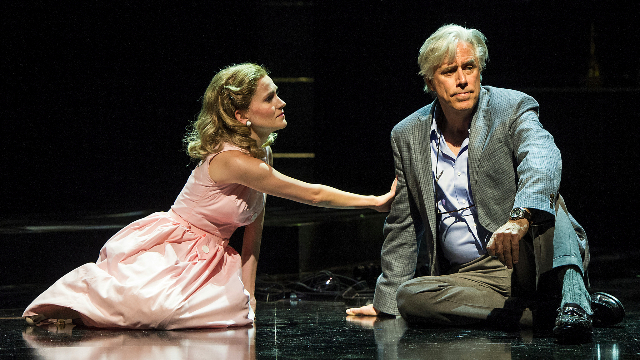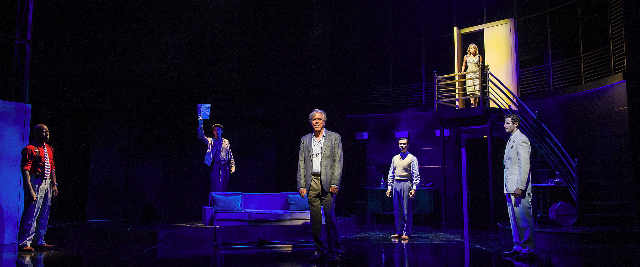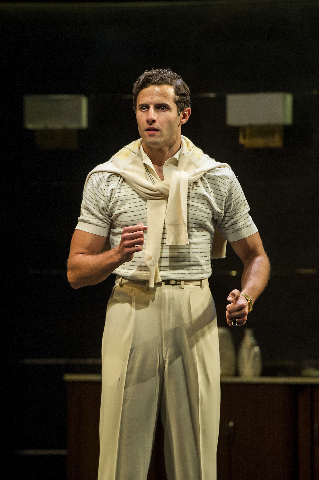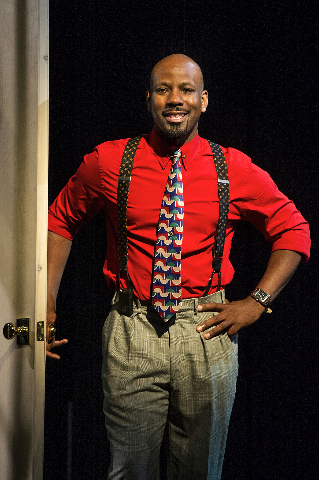A Legendary Romance in Williamstown
Music and Lyrics, Geoff Morrow, Book, Timothy Prager
By: Charles Giuliano - Aug 06, 2017
A Legendary Romance
Music and lyrics, Geoff Morrow, Book, Timothy Prager
Directed by Lonny Price
Music and orchestrations, Charlie Rosen directing an eight piece band
Set, James Noone; Costumes, Tracy Christensen; Lighting, Robert Wierzel; Sound, Kai Harada; Wigs and hair, David Bova and Jared Janas
Cast: Jeff McCarthy (Joseph Lindy), Maurice Jones (Producer), Lora Lee Gayer (Billie Hathaway), Jose-Maria Aguila (Mendez), Roe Hartrampf (Vincent Connor), Trevor Guyton (Delivery Man)
Photos by Daniel Rader
Williamstown Theatre Festival
August 3-20, 2017
First produced at New London Barn Playhouse, NH
It’s 1994 in a Hollywood screening room. His back turned to us on a rotating couch Joseph Lindy (Jeff McCarthy), a director who has been out of the game since the 1950s, views the closing scene of a film noir. It causes him to become agitated.
The film, whose ending Lindy strongly objects to, is a fictionalized version of his notorious life. It is a love story of the Legendary Romance between a blacklisted director and his actress fiancé Billie Hathaway (Lora Lee Gayer). Their careers ended as abruptly as their engagement during the era of McCarthyism and HUAC hearings that ruined the lives and careers of so many Jewish communist sympathizers in Hollywood.
The Red Scare that ensnared America launched the political careers of former B actor, Ronald Reagan, and another native of California, Congressman Richard Nixon. Eventually, America moved on from that fog of hysteria. Arguably, however, the left, socialism and liberal America have never recovered. Even our most recent Democratic presidents, Carter, Clinton and Obama, have been middle of the road moderates.
With Donald Trump in the White House and his far right, social and religious base, the musical A Legendary Romance, a work in progress at Williamstown Theatre Festival, is timely, relevant and poignant.
Given the current mantra of fake news and outside interference in our political process it resonates that Lindy objects to the liberties taken by the Producer (Maurice Jones) in a distorted film about his life.
With Hamlet the device of a play within a play was used by Shakespeare. With stunning impact this production creates the device of a film within a play. Initially, Lindy is reacting to the depiction of his life on screen. Later, quite brilliantly he will argue with the actors seemingly engaged in a dialogue with him.
It is a brilliant technical feat and just one of many hooks that make this musical so engaging. Add to that some terrific songs by Geoff Morrow conveyed with passionate conviction by McCarthy, the primary focus of this production, and the other superb players.
McCarthy is readily familiar to Berkshire audiences for his many musical and dramatic roles at Barrington Stage Company in Pittsfield. He opened the season there with a one man show Kunstler which is slated to travel. This is his first appearance with WTF.
On its opening last night the musical was a slam dunk with the audience but needs fine tuning before facing tough New York critics.
Characters and plot points, particularly the complexities of Hollywood on Trial, need more depth. Mostly that era and how it motivates the characters and their tragic actions are conveyed with zingers about Reagan, Nixon, Kazan and others and confusing non sequators. Too often it seems that characters and plot points get from A to C without passing through B.
When we first meet Billie Hathaway (Lora Lee Gayer) she is young and innocent reading for Lindy. She only has some 40 pages of the script but peppers him with questions about where the character is headed.
There is an initial self-effacing song “Me” when with humor Billie compares herself unfavorably to the assets of Hollywood stars. She doesn’t have the legs of Betty Grable or the shelf of Jane Russell. Her boyfriend, producer Howard Hughes, famously had a special bra designed to best present her marketable appeal in the film The Outlaw (1943).
We tend to agree that while perky and attractive Billie lacks star power. That makes all the more confounding her mercurial rise, under Joseph’s management, to top billing. We see that as a filmed montage. He announces a plan to put her name above the title of their next film. That never happens which is what this musical is all about.
He is intrigued and invites her to dinner. She responds with that here we go again, thanks but no thanks, to a session on the casting couch. There are stutter steps as they pursue that legendary romance. Is it based on true love or career expedience? She seems initially seduced and later appreciative of all that he has done for her.
Looking at the romantic couple there is a visual disconnect. McCarthy, a romantic leading man, is on the other side of the cusp of mid career. She is young and perky.
This is an awkward aspect of the premise of the production. When in the producer’s office in 1994 he is the correct age for the role. But there are flash backs to events with Billie in the 1950s. In a final remake of the film of his life he appears on screen with her. That takes a reality leap for the audience to connect with.
When Lindy is blacklisted, enter the familiar device of a Front played superbly by Roe Hartrampf as Vincent Connor a smarmy, clever and despicable climber and opportunist. He is a simulacrum for the ousted Lindy but soon warms to an assumed persona as producer/ director. He has his own ideas about scripts, rewrites and shooting. This extends to taking over Billie which may or may not have been true.
A 1976 Woody Allen film The Front was an early effort to address that dark time for Hollywood. Zero Mostel and others involved with the film had been blacklisted. There is the 2015 film Trumbo that starred Bryan Cranston.
Things get messy particularly with a reversal when Connor, which is an assumed name, is served to appear before HUAC. Now he too is caught in the cross hairs, proclaiming that not only is he not a communist, he’s not even Jewish.
Weighing alternatives and each possible solution-not appearing, committing perjury- ends with Lindy’s amused conclusion “Jail.” The only possible way out is to kill Connor. They deliberate how best to do that. As the Producer insists, Lindy killed Connor.
A body was never recovered although Lindy was the prime suspect.
In the film, which Lindy refuses to sign off on, the final scene has Connor shot and dying in the arms of Billie.
Not true Lindy insists. But the Producer, in a hilarious performance by Jones, insists that it’s just a movie. Sign here and you can leave with a nice check.
It appears, however, that Lindy is a man of principle. We never quite know how or why. If he truly loved Billie, as Connor argued, all he had to do was give up a name. Any name even one the committee already knew. That’s what Elia Kazan and others did continuing their careers but vilified by the film community.
This is a huge issue never nailed down by a musical and tragic love story with a social and political twist.
After a fatal confrontation Joseph shunned Billie and 40 years later the Producer tells him what became of her.
That results in one of the most stunning interludes in the musical. Appearing in black on a balcony she ascends as an apparition singing the gut wrenching lament “You Didn’t Call, You Didn’t Write.” Their final duets “The Things I Never Said” and “If You Should Ask Me” are thrilling, insightful and chilling.
What best emerges in the current state of this musical is a deeply moving, tragic love story.
As we have come to expect from WTF Main Stage productions is a superb, art deco, curved wall, with period sconces, and a metal staircase to an upper level aptly designed by James Noone. For every scene Billie has a new period outfit created by the inventive and meticulous Tracy Christensen. She also had fun dressing the sleek and slender Hartrampf as an opportunistic, 1950s, ersatz producer. Certainly she has him looking the part.
By my count Billie had three different wigs designed by David Bova and Jared Janas. The most interesting one was as a disheveled brunette complementing that funereal black dress.
This is the second staging of the musical and it is usual for there to be more regional productions before heading for prime time. Even in its current form this musical is destined for greatness. It was a thrill to see it first in the Berkshires.




